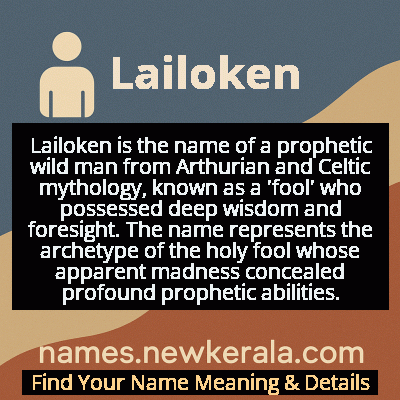Lailoken Name Meaning & Details
Origin, Popularity, Numerology Analysis & Name Meaning of Lailoken
Discover the origin, meaning, and cultural significance of the name LAILOKEN. Delve into its historical roots and explore the lasting impact it has had on communities and traditions.
Name
Lailoken
Gender
Male
Origin
Arthurian
Lucky Number
7
Meaning of the Name - Lailoken
Lailoken is the name of a prophetic wild man from Arthurian and Celtic mythology, known as a 'fool' who possessed deep wisdom and foresight. The name represents the archetype of the holy fool whose apparent madness concealed profound prophetic abilities.
Lailoken - Complete Numerology Analysis
Your Numerology Number
Based on Pythagorean Numerology System
Ruling Planet
Neptune (Ketu)
Positive Nature
Intuitive, analytical, spiritual, and inquisitive.
Negative Traits
Secretive, reserved, aloof, and can be overly critical.
Lucky Colours
Green, yellow.
Lucky Days
Monday.
Lucky Stones
Cat’s eye, moonstone.
Harmony Numbers
1, 5, 6.
Best Suited Professions
Scientists, researchers, spiritual leaders, detectives.
What People Like About You
Depth of knowledge, analytical skills, spirituality.
Famous People Named Lailoken
Lailoken
Prophetic Wild Man
Legendary Welsh prophet and madman who predicted deaths and battles, considered a prototype for Merlin
Myrddin Wyllt
Welsh Prophet
Welsh counterpart to Lailoken, driven mad after the Battle of Arfderydd and living as a wild man in the Caledonian Forest
Merlin Caledonensis
Scottish Prophet
Scottish version of Merlin based on Lailoken traditions, featured in Scottish chronicles and prophetic literature
Name Variations & International Equivalents
Click on blue names to explore their detailed meanings. Gray names with will be available soon.
Cultural & Historical Significance
His character embodies the Celtic tradition of the 'geilt' or wild man—a figure who, though mad by conventional standards, possesses deep wisdom and supernatural insight. This archetype reflects the Celtic belief that madness could be a gateway to divine knowledge, and that those society deemed 'fools' might actually be the wisest of all. The Lailoken stories significantly influenced the development of the Merlin character in Arthurian legend, particularly the aspect of Merlin as a wild prophet living in the forest, separate from the more courtly wizard of later French romances.
Extended Personality Analysis
Lailoken embodies a complex duality of madness and wisdom, representing the archetype of the 'holy fool' who sees truth where others see only chaos. His personality is characterized by periods of intense prophetic clarity alternating with bouts of wild, uncontrollable madness. When in his prophetic states, Lailoken demonstrates profound insight into future events, political outcomes, and human nature, often delivering his visions in poetic form.
However, these moments of clarity are balanced by his 'foolish' aspects—he lives as a wild man in the forest, communicates with animals, and behaves erratically, making him an outcast from normal society. This combination creates a personality that is both deeply intuitive and emotionally volatile, capable of great wisdom but unable to function within conventional social structures. His character suggests that true wisdom often exists outside societal norms and that what appears as madness may actually be a different form of perception.
Modern Usage & Popularity
In contemporary times, Lailoken remains an extremely rare given name, primarily used by enthusiasts of Arthurian legend, Celtic mythology, or historical Welsh names. Its usage is almost exclusively limited to families with strong connections to Celtic cultural heritage or those seeking unique mythological names. The name has seen minimal popularity in naming statistics and is considered a 'deep cut' in Arthurian naming conventions—much less common than Merlin or Arthur but appreciated by connoisseurs of medieval literature. Modern usage often reflects an interest in the wild, prophetic aspects of the character rather than the courtly wizard imagery of later Merlin traditions. Some neo-pagan and Celtic revival movements have shown interest in the name for its connections to ancient prophetic traditions and wild nature spirituality.
Symbolic & Spiritual Meanings
Lailoken symbolizes the complex relationship between madness and wisdom, wilderness and civilization, prophecy and folly. He represents the archetype of the 'wild sage'—someone who has rejected or been rejected by society but gains deeper understanding as a result. Symbolically, Lailoken embodies the idea that true wisdom often requires stepping outside conventional thinking and that what society labels as 'madness' might actually be a different form of perception. His life in the forest symbolizes a return to primal nature and the wisdom that can be found in wild places. The character also represents the tension between Christian and pagan worldviews in early medieval Britain—a prophet who operates outside church authority yet delivers divine truths. Lailoken serves as a symbolic bridge between human civilization and the natural world, between rational thought and intuitive knowing.

